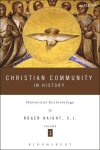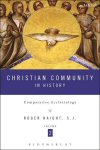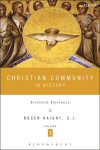Christian Community in History (3 vols.)
Digital Verbum Edition
Overview
This trilogy presents a massive study in ecclesiology by Roger D. Haight, SJ. This multi-layered work traces the development of the church’s understanding of itself from the time of Christ, through the Reformation, to the present day.
In the first two volumes, Historical Ecclesiology and Comparative Ecclesiology, Haight examines the structure of the Christian church at each period of its development, striving to be faithful to the historical, social, and political reality of each era. The third volume, Ecclesial Existence, describes the commonalities between churches—retrieving ecclesiological constants from Scripture to portray the shared ecclesial existence among today’s churches.
In the Verbum editions, these volumes are enhanced by amazing functionality. Important terms link to dictionaries, encyclopedias, and a wealth of other resources in your digital library. Perform powerful searches to find exactly what you’re looking for. Take the discussion with you using tablet and mobile apps. Your software brings the most efficient and comprehensive research tools together in one place, so you get the most out of your study.
Take your studies further with the Catholic Church and Ecclesiology Collection (6 vols.).
Key Features
- Traces the ecclesiological development of the church through history
- Looks at the pre- and post-Reformation church’s understanding of itself
- Examines the commonalities of all Christian churches today
Praise for the Print Edition
While maintaining the theological nature of his study, Roger Haight’s historical ecclesiology lays a sturdy foundation in a historical, sociological analysis of the beginnings and development of the Christian church from its origin in Jesus of Nazareth to the eve of the Reformation . . . each chapter concludes with a social historical analysis and a few illuminating pages that draw out principles for historical theology. It is these analytic pages that set Haight’s book apart from other studies. . . . This is a groundbreaking volume.
—Catholic Books Review
Roger Haight’s massive work, Christian Community in History, is a significant achievement. . . . Haight writes clearly, with a deep historical sense and a good understanding of theological issues.
—Scottish Journal of Theology
Product Details
- Title: Christian Community in History
- Author: Roger D. Haight
- Publisher: T&T Clark
- Publication Date: 2014
- Volumes: 3
- Pages: 1,328
- Christian Group: Catholic
- Resource Type: Histories
- Topic: Ecclesiology
Individual Titles

Roger D. Haight presents a historical ecclesiology which is concrete, realist, and historically conscious. In what he terms an “ecclesiology from below,” Haight charts the history of the church's self-understanding from the origins of the church in the time of Christ to the late Middle Ages. While the ultimate focus of the work falls on the structure of the church and its theological self-understanding, it tries to be faithful to the historical, social, and political reality of the church in each period.

Roger D. Haight’s “ecclesiology from below,” moves through the actual church of history to ecclesiology or to an understanding of the church both as it is and as it should be.
In volume 2 of Haight’s series, Comparative Ecclesiology, ecclesiology itself becomes directly the subject matter of the book, without losing sight of concrete history and the degree to which these ecclesiologies are historically conditioned. The main goal of this “comparative ecclesiology” is not just to examine different ecclesiologies that emerged over the last 500 years, but also to show the richness, vitality, and creativity of the whole church as it moves through history, adjusting to new times, places, and cultures.
Roger Haight has made a major contribution to the area of ecclesiology. His contributions will clearly have a lasting value. This book is highly recommended for anyone interested in theology and the history of the Church.
—Catholic Library World

The first two volumes of Roger Haight’s Christian Community in History received enormous critical attention. They described the historical diversity of the church across its history, and among the churches after the Reformation. The third volume, Ecclesial Existence, describes what the churches have in common—finding the apostolicity, the catholicity, and the unity amidst the plurality of the churches.
With Ecclesial Existence, Roger Haight has completed the impressive trilogy Christian Community in History. Drawing on an impressive knowledge of how the Church has been understood through the ages, Haight moves beyond history to probe the essence of the Church in all its diversity. . . . A crowning achievement.
—Paul Avis, general secretary, The Council for Christian Unity of the Church of England
Roger Haight here completes his distinguished ecclesiological trilogy with a brilliant third volume challenging regnant conceptions of the search for unity among the different communions. . . . It is well worth considering from local congregations to the highest levels of ecclesiastical authority.
—Lewis S. Mudge, Robert Leighton Stuart Professor of Theology, Emeritus, San Francisco Theological Seminary and the Graduate Theological Union, Berkeley
About the Roger D. Haight
Roger D. Haight, SJ, has a PhD from the University of Chicago and a STL from the Jesuit School of Theology in Chicago. He has taught for over 30 years in Jesuit schools of theology in Chicago, Toronto, the Philippines, and Cambridge, Massachusetts. He has been a visiting professor in France, India, Peru, and Kenya. He is a past president of the Catholic Theological Society of America (1994–95). His book, Dynamics of Theology won second place in 1991’s Catholic Press Association (CPA) Book Award for Theology. Another book, Jesus Symbol of God, won first place in CPA’s 2000 Book Award for theology, but was censured by the Congregation for the Doctrine of the Faith. Haight currently teaches at Union Theological Seminary in New York City.
Take your studies further with the Catholic Church and Ecclesiology Collection (6 vols.).
Key Features
- Traces the ecclesiological development of the church through history
- Looks at the pre- and post-Reformation church’s understanding of itself
- Examines the commonalities of all Christian churches today
Praise for the Print Edition
While maintaining the theological nature of his study, Roger Haight’s historical ecclesiology lays a sturdy foundation in a historical, sociological analysis of the beginnings and development of the Christian church from its origin in Jesus of Nazareth to the eve of the Reformation . . . each chapter concludes with a social historical analysis and a few illuminating pages that draw out principles for historical theology. It is these analytic pages that set Haight’s book apart from other studies. . . . This is a groundbreaking volume.
—Catholic Books Review
Roger Haight’s massive work, Christian Community in History, is a significant achievement. . . . Haight writes clearly, with a deep historical sense and a good understanding of theological issues.
—Scottish Journal of Theology
Product Details
- Title: Christian Community in History
- Author: Roger D. Haight
- Publisher: T&T Clark
- Publication Date: 2014
- Volumes: 3
- Pages: 1,328
- Christian Group: Catholic
- Resource Type: Histories
- Topic: Ecclesiology
About Roger D. Haight
Roger D. Haight, SJ, has a PhD from the University of Chicago and a STL from the Jesuit School of Theology in Chicago. He has taught for over 30 years in Jesuit schools of theology in Chicago, Toronto, the Philippines, and Cambridge, Massachusetts. He has been a visiting professor in France, India, Peru, and Kenya. He is a past president of the Catholic Theological Society of America (1994–95). His book, Dynamics of Theology won second place in 1991’s Catholic Press Association (CPA) Book Award for Theology. Another book, Jesus Symbol of God, won first place in CPA’s 2000 Book Award for theology, but was censured by the Congregation for the Doctrine of the Faith. Haight currently teaches at Union Theological Seminary in New York City.